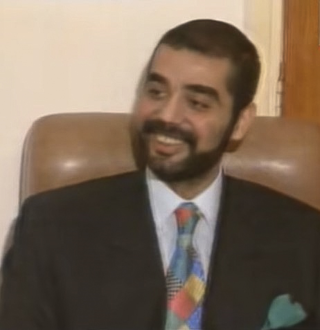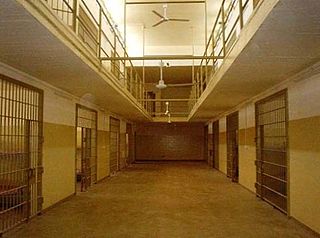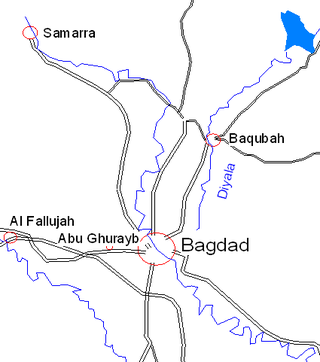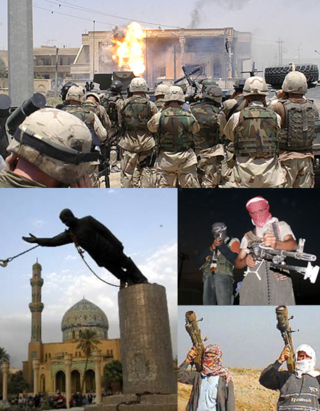Related Research Articles

Saddam Hussein Abd al-Majid al-Tikriti, was an Iraqi politician and revolutionary who served as the fifth president of Iraq from 1979 to 2003. He also served as prime minister of Iraq from 1979 to 1991 and later from 1994 to 2003. He was a leading member of the revolutionary Arab Socialist Ba'ath Party, and later, the Baghdad-based Ba'ath Party and its regional organization, the Iraqi Ba'ath Party, which espoused Ba'athism, a mix of Arab nationalism and Arab socialism.

Iraq actively researched and later employed weapons of mass destruction (WMD) from 1962 to 1991, when it destroyed its chemical weapons stockpile and halted its biological and nuclear weapon programs as required by the United Nations Security Council. The fifth president of Iraq, Saddam Hussein, was internationally condemned for his use of chemical weapons against Iranian and Kurdish civilians during the Iran–Iraq War in the 1980s. Saddam pursued an extensive biological weapons program and a nuclear weapons program, though no nuclear bomb was built. After the Gulf War, the United Nations located and destroyed large quantities of Iraqi chemical weapons and related equipment and materials; Iraq ceased its chemical, biological and nuclear programs.

Uday Saddam Hussein was an Iraqi politician and the elder son of Saddam Hussein. He held numerous positions as a sports chairman, military officer and businessman, and was the head of the Iraqi Olympic Committee and Iraq Football Association, and head of the Fedayeen Saddam.

Tariq Aziz was an Iraqi politician who served as Deputy Prime Minister, Minister of Foreign Affairs and a close advisor of President Saddam Hussein. Their association began in the 1950s when both were activists for the then-banned Arab Socialist Ba'ath Party. He was both an Arab nationalist and a member of the Chaldean Catholic Church.

The United States-led invasion of the Republic of Iraq was the first stage of the Iraq War. The invasion phase began on 19 March 2003 (air) and 20 March 2003 (ground) and lasted just over one month, including 26 days of major combat operations, in which a combined force of troops from the United States, the United Kingdom, Australia and Poland invaded Iraq. Twenty-two days after the first day of the invasion, the capital city of Baghdad was captured by coalition forces on 9 April 2003 after the six-day-long Battle of Baghdad. This early stage of the war formally ended on 1 May 2003 when U.S. President George W. Bush declared the "end of major combat operations" in his Mission Accomplished speech, after which the Coalition Provisional Authority (CPA) was established as the first of several successive transitional governments leading up to the first Iraqi parliamentary election in January 2005. U.S. military forces later remained in Iraq until the withdrawal in 2011.

Iraq under the Arab Socialist Ba'ath Party saw severe violations of human rights. Secret police, state terrorism, torture, mass murder, genocide, ethnic cleansing, rape, deportations, extrajudicial killings, forced disappearances, assassinations, chemical warfare, and the destruction of the Mesopotamian marshes were some of the methods Saddam Hussein and the country's Ba'athist government used to maintain control. Saddam committed crimes of aggression during the Iran–Iraq War and the Gulf War, which violated the Charter of the United Nations. The total number of deaths and disappearances related to repression during this period is unknown, but is estimated to be at least 250,000 to 290,000 according to Human Rights Watch, with the great majority of those occurring as a result of the Anfal genocide in 1988 and the suppression of the uprisings in Iraq in 1991. Human Rights Watch and Amnesty International issued regular reports of widespread imprisonment and torture.

Ann Clwyd Roberts was a Welsh Labour politician who served as Member of Parliament (MP) for Cynon Valley for 35 years, from 1984 until 2019. Although she had intended to stand down in 2015, she was re-elected in that year's general election and in 2017 before standing down in 2019. Clwyd is the longest-serving female MP for a Welsh constituency.

After the 2003 invasion of Iraq, evidence began to emerge of failed attempts by the Iraqi government to bring the conflict to a peaceful resolution.

Abu Ghraib prison was a prison complex in Abu Ghraib, Iraq, located 32 kilometers (20 mi) west of Baghdad. Abu Ghraib prison was opened in the 1950s and served as a maximum-security prison. From the 1970s, the prison was used by Saddam Hussein to hold political prisoners and later the United States to hold Iraqi prisoners. It developed a reputation for torture and extrajudicial killing, and was closed in 2014.

Abu Ghraib is a city in the Baghdad Governorate of Iraq, located just west of Baghdad's city center, or northwest of Baghdad International Airport. It has a population of 189,000 (2003). The old road to Jordan passes through Abu Ghraib. The government of Iraq created the city and Abu Ghraib District in 1944.

During the early stages of the Iraq War, members of the United States Army and the Central Intelligence Agency committed a series of human rights violations and war crimes against detainees in the Abu Ghraib prison in Iraq, including physical abuse, sexual humiliation, both physical and psychological torture, rape, as well the killing of Manadel al-Jamadi and the desecration of his body. The abuses came to public attention with the publication of photographs of the abuse by CBS News in April 2004. The incidents caused shock and outrage, receiving widespread condemnation within the United States and internationally.
The Iraqi High Tribunal (IHT), formerly the Iraqi Special Tribunal and sometimes referred to as the Supreme Iraqi Criminal Tribunal, is a body established under Iraqi national law to try Iraqi nationals or residents accused of genocide, crimes against humanity, war crimes or other serious crimes committed between 1968 and 2003. It organized the trial of Saddam Hussein and other members of his Ba'ath Party regime.
Farzad Bazoft was an Iranian journalist who settled in the United Kingdom in the mid-1970s. He worked as a freelance reporter for The Observer. He was arrested by Iraqi authorities and executed in 1990 after being convicted of spying for Israel while working in Iraq.

The Human Shield Action to Iraq was a group of people who traveled to Iraq to act as human shields with the aim of preventing the U.S.-led coalition forces from bombing certain locations during the 2003 invasion of Iraq.

The trial of Saddam Hussein was the trial of the deposed President of Iraq Saddam Hussein by the Iraqi Interim Government for crimes against humanity during his time in office.

There are various rationales for the Iraq War, both the 2003 invasion of Iraq and the subsequent hostilities. The George W. Bush administration began actively pressing for military intervention in Iraq in late 2001. The primary rationalization for the Iraq War was articulated by a joint resolution of the United States Congress known as the Iraq Resolution. The US claimed the intent was to "disarm Iraq of weapons of mass destruction, to end Saddam Hussein's alleged support for terrorism, and to supposedly free Iraqi people".

The Iraq War was a protracted armed conflict in Iraq from 2003 to 2011. It began with the invasion of Iraq by the United States-led coalition that overthrew the Ba'athist government of Saddam Hussein. The conflict continued for much of the next decade as an insurgency emerged to oppose the coalition forces and the post-invasion Iraqi government. US troops were officially withdrawn in 2011. The United States became re-involved in 2014 at the head of a new coalition, and the insurgency and many dimensions of the armed conflict are ongoing. The invasion occurred as part of the George W. Bush administration's war on terror following the September 11 attacks.

The United Nations Monitoring, Verification and Inspection Commission (UNMOVIC) and the U.S.-led Iraq Survey Group (ISG) failed to find any of the alleged stockpiles of weapons of mass destruction in Iraq that were used as an impetus for the 2003 invasion. The United States effectively terminated the search effort for unconventional weaponry in 2005, and the Iraq Intelligence Commission concluded that the judgements of the U.S. intelligence community about the continued existence of weapons of mass destruction and an associated military program were wrong. The official findings by the CIA in 2004 were that Iraqi leader Saddam Hussein "did not possess stockpiles of illicit weapons at the time of the U.S. invasion in March 2003 and had not begun any program to produce them."
This article is a chronological listing of allegations of meetings between members of al-Qaeda and members of Saddam Hussein's government, as well as other information relevant to conspiracy theories involving Saddam Hussein and al-Qaeda.

Bakhtiar Amin is a Kurdish Iraqi politician who was the Human Rights Minister in the Iraqi Interim Government from June 2004 to May 2005.
References
- ↑ Ross, Brian (December 30, 2006). "Saddam Executed; An Era Comes to an End". ABC News . Archived from the original on February 24, 2015.
- ↑ Garamone, Jim (December 17, 2005). "Prison Stands as Testament to Saddam's Evil". American Forces Press Service . United States Department of Defense. Archived from the original on September 23, 2015.
- 1 2 3 O'Neill, Brendan (February 25, 2004). "The missing people-shredder". The Guardian . ISSN 0261-3077 . Retrieved June 3, 2022.
- ↑ Clwyd, Ann (March 18, 2003). "See men shredded, then say you don't back war". The Times . Retrieved June 3, 2022.(subscription required)
- ↑ Ashley, Jackie (June 23, 2003). "How a Labour rebel became friends with US hawks". The Guardian. Retrieved June 3, 2022.
- ↑ Lloyd, John (31 January 2004). "In defence of the invasion". The Globe and Mail . Retrieved June 3, 2022.
- ↑ "Saddam witness tells of meat grinder". The Sydney Morning Herald . December 6, 2005. Retrieved June 3, 2022.
- ↑ de Borchgrave, Arnaud (March 21, 2003). "Lucky Break for Jordan". United Press International . Archived from the original on January 13, 2004.
- ↑ Hari, Johann (March 26, 2003). "Sometimes, the only way to spread peace is at the barrel of a gun". The Independent . Retrieved June 3, 2022.
- ↑ "Truth Justice Peace » Human Shield Action to Iraq". p10k.net. Archived from the original on October 1, 2007.
- ↑ "update human shields (english)". Indymedia . March 31, 2003. Retrieved June 3, 2022.
- ↑ O’Neill, Brendan (February 21, 2004). "Not a shred of evidence". The Spectator . Retrieved June 3, 2022.
- ↑ Ann Clwyd MP (February 27, 2004). "Letters: Indict's evidence". The Guardian. Retrieved June 3, 2022.
- ↑ O'Neill, Brendan (March 2, 2004). "Letters: No Evidence". The Guardian. Retrieved June 3, 2022.
- ↑ O'Neill, Brendan (February 4, 2010). "The media's tall tales over Iraq". The Guardian. Retrieved June 3, 2022.
